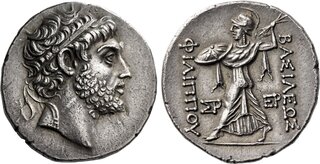| Numismatica Ars Classica > Auction 146 | Auction date: 8 May 2024 |
| Lot number: 2161 Price realized: This lot is for sale in an upcoming auction - Bid on this lot  | Show similar lots on CoinArchives Find similar lots in upcoming auctions on |
| Lot description: Philip V, 221 – 179. Tetradrachm, Pella or Amphipolis circa 220-211, AR 30 mm, 16.88 g. Diademed head of Philip V r. Rev. ΒΑΣΙΛΕΩΣ – ΦΙΛΙΠΠΟΥ Athena Alchidemos striding l., holding thunderbolt and shield; in inner fields, ΣΡ – ΕΡ. SNG Alpha Bank 1050. SNG München 1124. AMNG III, pl. 34, 16. Boehringer, Chronologie, pl. VII, 6 (this obverse die). Mamroth 1. Rare and in exceptional condition for the issue, among the finest specimens known. A portrait of great beauty, the work of a very talented engraver, struck in high relief on excellent metal. Wonderful old cabinet tone and extremely fine Ex Ars Classica XVI, 1933, 1052; M&M 28, 1964, 121 and New York V, 2003, 102 sales. The reign of Philip V (221-179 BC) revived the Macedonian kingdom and raised it to new glories only to see these gains smashed to pieces on the rock of Rome and to set in motion the political developments that would lead to the complete dissolution of the kingdom under his son and successor Perseus. In 220 BC, Philip V brought together many of the cities of Greece under Macedonian domination as the Hellenic League and used these allies to support him in prosecuting the Social War (220-217 BC). The primary aim of this conflict was to reduce the power of the Aetolian League, an expanding federal state of northern Greece that was traditionally hostile to Macedonian ambitions. The war concluded with the containment of Aetolian influence in mainland Greece and Philip's sack of the League's administrative capital at Thermon. Flushed with victory, the Macedonian king then made attempts to expand his power into neighbouring Illyria. This region and its kings had previously fallen under Roman influence in the aftermath of the First Illyrian War (229-228 BC), but Philip V took no notice of this since the Romans were distracted by the ongoing Second Punic War (218-201 BC) and he had come to an agreement with Hannibal. Unfortunately, Philip's initial assaults on Illyria were complete failures. When the Romans learned of his alliance with their Carthaginian arch-enemy and despite the continuing conflict in Italy, they embarked on the First Macedonian War (214-205 BC) against Philip V. In the early stages of this struggle, the Macedonian king took possession of several cities of the Illyrian interior and even the coastal city of Lissus but could not make adequate use of them to hold back the Romans due to the destruction of his fleet in his earlier attempts on Illyria. Nevertheless, the Roman fear that the Macedonian king might still be able to strike at Italy in support of Hannibal led them to continue the war and strike an alliance with the Aetolian League. For the most part, Philip managed to best these allies until 210 BC, when their victory over Macedonian forces at Anticyrus in Phocis brought Sparta and Attalus I of Pergamum into the war on the Roman side. Even then, the king successfully beat back his numerous enemies and could claim victory after a renewed Punic threat in Italy forced most of the Roman forces to withdraw and a Bithynian invasion of the Attalid kingdom forced Attalus I to redirect his energy. In 206 BC, Philip V again sacked Thermon and brought the Aetolian League to terms. A small Roman force attempted to continue the war in 205 BC, but this proved impossible without allies and the war was settled by the Peace of Phoenice, a treaty that recognized Philip's supremacy in Greece and many of his Illyrian conquests but prohibited him from further westward expansion. Having settled his affairs in the West, Philip V immediately looked East to make new conquests. To this end, he made an agreement with the Seleucid king Antiochus III to divide between them the Thracian and Asian territories of the child king Ptolemy V Epiphanes and immediately set about expelling Ptolemaic garrisons in Thrace and western Asia Minor. At the same time, the Macedonian king sparked the Cretan War (205-200 BC) through his use of Cretan pirates to take control of the Aegean Sea and to avenge himself on Attalus I. The conflict brought a new coalition of Rhodes, Byzantium, Cos, Cyzicus and Attalus I against the king, but despite setbacks on his Carian campaign, Philip continued to seize cities in western Asia Minor. In 200 BC a new warning came from the Romans-now free from the Punic menace in Italy-that advised Philip V to stop his activities or face war. Estimate: 40000 CHF |  |



